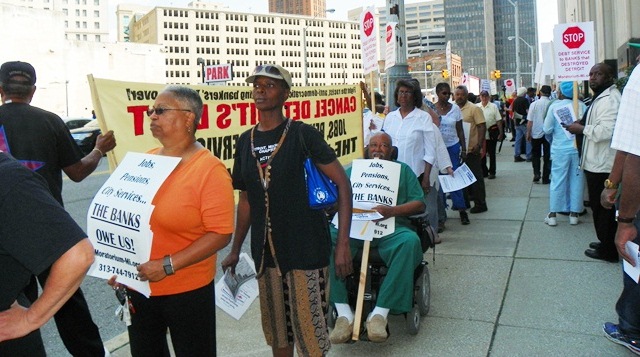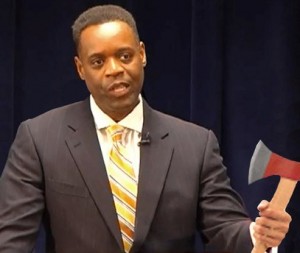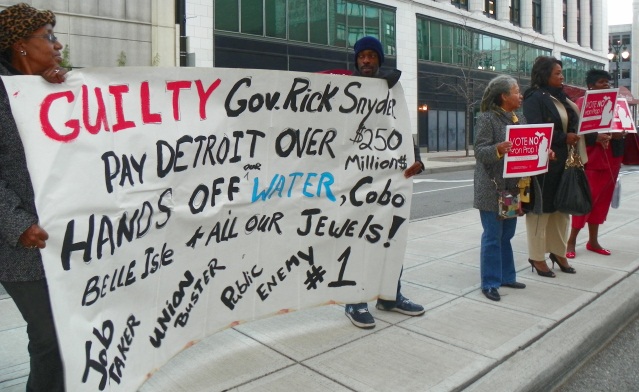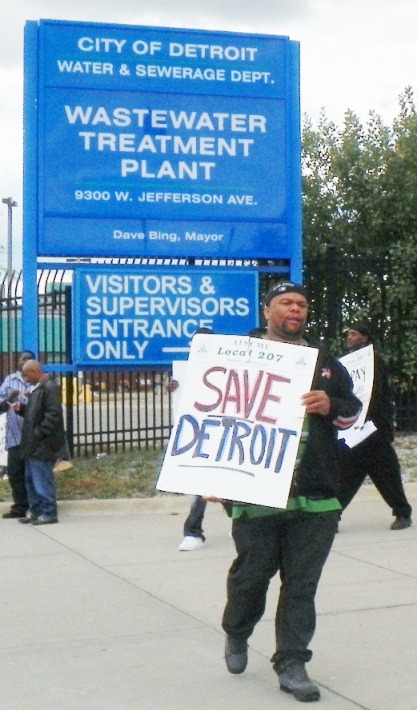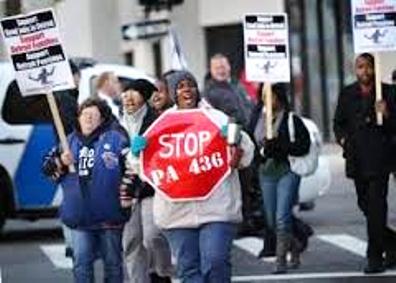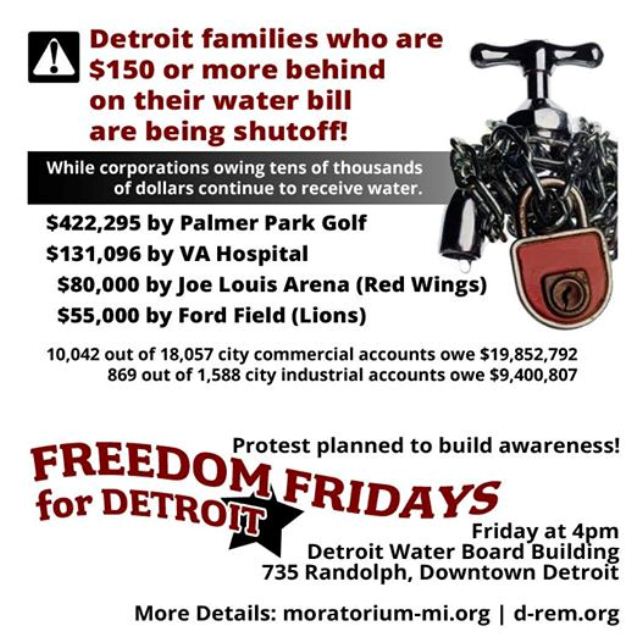Retirees hold $7.4 billion in claims, other “impaired” classes: $3.8 billion
Retiree groups, unions sell out Detroit while Puerto Rico threatens general strike
By Diane Bukowski
Analysis
June 17, 2014
DETROIT – A VOD analysis of Detroit bankruptcy claims shows that Detroit retirees hold the majority of votes on the current Plan of Adjustment (POA), and can at least stall drastic cuts to their pensions, annuity savings plans, and health care benefits with a “NO” vote.
“Impaired” classes who face losses are the only ones allowed to vote, according to Chapter 9 statutes. Votes are weighted according to claim amounts. If the total vote represents more than half the amount of impaired claims, it prevails, whether “yes” or “no.”
Retirees hold a total of $7.4 billion in Class 10, 11 and 12 claims (Detroit Police and Fire Retirement System, Detroit General Retirement System, and OPEB benefits), according to figures in the POA. Other impaired classes hold a total of $3.8 billion. These include Certificates of Participation (COPS) investors, Unlimited and Limited Tax General Obligation (ULTGO AND LGTBO) bondholders, and Downtown Development Authority claims. (Click on DB Claims chart for list of classes and claims.)
Unimpaired bondholders cannot vote on the plan. They include Department of Water and Sewerage, General Obligation, HUD, and Parking Department creditors, who will be paid a total of at least $5.6 billion if the majority of those in the impaired classes vote “YES.”
“I say NO, NO TO ALL OF IT,” retiree Gloria Jones told VOD. “I’m not giving up my right to fight in court at a later date. It’s unconstitutional, all of it.”Jones said she has not even received a ballot yet, although she retired on duty disability in 1991, and transitioned to regular retirement in 2010, calling into question the accuracy of the balloting procedures. This author, a retiree, has received a separate ballot for OPEB benefits (Class 12), while others she has talked to have not.
Add to that the chaos caused by the re-issue of at least 3,000 ballots because they had incorrect figures.
“I feel equally compelled to caution you that whether you vote “Yes” or “No”, the honest counting of that vote is essential,” mayoral candidate Tom Barrow wrote. “Only blind trust in Snyder and Orr would cause you to be so trusting as to not be suspicious where the people counting your life altering ballot are doing it all the way in California…where you, your friends and interested folks are NOT…why? . . the group doing the counting [KCC] is one recommended by the very law firm [Jones Day] which brought you to this unwarranted bankruptcy and has a long routine business relationship with the law firm.”
Regardless of the vote’s outcome, U.S. Bankruptcy Judge Steven Rhodes has the ability to “cram down” the plan if even one impaired class accepts it. So far, deals have been worked out with impaired creditors ULTGO bondholders, who have agreed to receive 74 percent of their claim, $388 million, while COPS swapholders have agreed to $85 million. Orr has a proposal in the plan to pay 40 percent of the entire COPS outstanding debt of $150 billion.

Puerto Rican teachers struck for 2 days in Feb. 2014; won Supreme Court decision striking down changes to their pensions.
“DRCEA sold our asses out,” retiree Jones declared, referring to Shirley Lightsey’s Detroit Retired City Employees Association. Despite the power retirees hold, it is astounding that the leadership of the retirement systems and unions is caving in to Orr.
Even if Orr opts to “cram down” the POA, unions across Puerto Rico have shown what can be done. There, they have threatened a general strike like the one they carried out in 2009 in opposition to the imposition of a Detroit-style austerity plan, aided also by Jones Day Puerto Rican teachers conducted a two-day strike in February. In April, the Puerto Rican Supreme Court struck down cuts in their pensions. Rotating strikes by other unions including bus drivers and ferry workers are hitting constantly in preparation for the general strike.
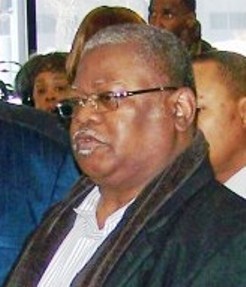
AFSCME”S Ed McNeil is on the court-appointed Official Committee of Retirees, whose law firm Denton’s sent out a letter campaigning for a “Yes” vote.
But lily-livered leaders of retiree associations, the retirement systems, and the unions in Detroit are recommending retirees vote “Yes” on a plan that has no guarantees for their life-time support whatever.
Both the DRCEA and the Detroit Retired Police and Firefighters Association (DPFFA), neither of which represent all retirees, are recommending a “Yes” vote. Denton’s, the law firm representing the court-appointed Official Committee of Retirees, has also weighed in for a “yes” vote. (Not surprisingly, AFSCME’s Ed McNeil shoved Rose Roots, president of AFSCME Retirees Sub-Chapter 98, aside to sit on that committee.)
The city’s two retirement systems are on the verge of recommending a Yes vote, as has been demonstrated during their two general meetings, which one retiree termed “dog and pony shows.”
This is despite the fact that the retirement systems and unions have seven lawsuits against Rhodes’ bankruptcy eligibility ruling pending at the Sixth Circuit Court of Appeals, backed by amicus briefs from the largest pension system in the country, the California Public Employees Retirement System (CALPERS), the AARP, and others. A “Yes” vote allegedly means giving up any and all appeal rights.
 So far, Rhodes says, at least 600 individuals “not represented by attorneys” have filed objections to the POA before the deadline of July 11. Rhodes, however, set up oral hearings only for those filed prior to June 10, on July 15, 2014, at 9:30 a.m. and 2 p.m., at the U.S. Federal Courthouse, Rm 712, 231 W. Lafayette in downtown Detroit. (Click on Court hearing docket5264 ObjectionToPOA for Rhodes’ full order.)
So far, Rhodes says, at least 600 individuals “not represented by attorneys” have filed objections to the POA before the deadline of July 11. Rhodes, however, set up oral hearings only for those filed prior to June 10, on July 15, 2014, at 9:30 a.m. and 2 p.m., at the U.S. Federal Courthouse, Rm 712, 231 W. Lafayette in downtown Detroit. (Click on Court hearing docket5264 ObjectionToPOA for Rhodes’ full order.)
Rhodes said in his original order regarding objections that they must cite specific parts of the Bankruptcy Code.
VOD has compiled the following lengthy list of code violations, which will be submitted to the court.
11 U.S. CODE § 109 – WHO MAY BE A DEBTOR
An entity may be a debtor under chapter 9 of this title if and only if such entity—
(1) is a municipality:
(3) is insolvent;
(4) desires to effect a plan to adjust such debts.
(C) is unable to negotiate with creditors because such negotiation is impracticable.
OBJECTIONS:
- Kevyn Orr is not a municipality, but an appointed agent of the state of Michigan.
- Detroit is not insolvent according to the Nov 2013 report from DEMOS. None of the three major witnesses at the eligibility hearings were expert witnesses, so were not qualified to testify on insolvency.
- Neither the people of Detroit, nor any elected official representing them, have indicated their desire to file bankruptcy.
- A council representing all the city’s unions negotiated a plan to save Detroit hundreds of millions of dollars with Mayor Dave Bing in 2012, but Gov. Snyder prevented the City Council from voting to approve the plan.
11 U.S. Code § 903 – RESERVATION OF STATE POWER TO CONTROL MUNICIPALITIES
This chapter does not limit or impair the power of a State to control, by legislation or otherwise, a municipality of or in such State in the exercise of the political or governmental powers of such municipality, including expenditures for such exercise, but—
State law prescribing a method of composition of indebtedness of such municipality may not bind any creditor that does not consent to such composition; and
(2) a judgment entered under such a law may not bind a creditor that does not consent to such composition.
OBJECTION:
- Judge Rhodes evidently used this statute to recognize the Emergency Manager Law, PA 436, but it is still subject to ongoing litigation in a higher court, the U.S. District Court.
- Additionally, hundreds of thousands of residents of the majority-Black Michigan cities under the control of Emergency Managers, as well as 53 percent of the state electorate re: PA 4, have expressed their opposition to the entirety of these EM laws.
- THEREFORE NO DETROIT RESIDENT, WORKER OR RETIREE should be bound by ANY PROVISION OF PA 436, or by any act of dictator Kevyn Orr, appointed under PA 436.
11 U.S. CODE § 904 – LIMITATION ON JURISDICTION AND POWERS OF COURT
Notwithstanding any power of the court, unless the debtor consents or the plan so provides, the court may not, by any stay, order, or decree, in the case or otherwise, interfere with—
(1) any of the political or governmental powers of the debtor;
(2) any of the property or revenues of the debtor; or
(3) the debtor’s use or enjoyment of any income-producing property.
OBJECTION:
- Judge Rhodes evidently has interpreted this key section of Chapter 9 to mean the debtor has consented to such alterations, recognizing Kevyn Orr as the debtor.
- Litigation on that matter is pending in higher courts including U.S District Court and the Sixth Circuit Court of Appeals. As Rev. Bill Wylie-Kellerman shouted out at one hearing, “JONES DAY [Kevyn Orr’s allegedly previous employer] IS NOT THE CITY OF DETROIT!” No legal representative of the city has consented to the massive dismemberment of Detroit taking place under Chapter 9.
11 U.S. CODE § 921 – PETITION AND PROCEEDINGS RELATING TO PETITION
(c)After any objection to the petition, the court, after notice and a hearing, may dismiss the petition if the debtor did not file the petition in good faith or if the petition does not meet the requirements of this title.
OBJECTIONS:
- Kevyn Orr did NOT file the petition in good faith, and Judge Rhodes is not hearing the case in good faith.
- The Detroit bankruptcy was planned by various banks, the law firms of Jones Day, Ernst & Young, Miller Buckfire/Stifel and others hired by Gov. Rick Snyder as early as 2011, long before the filing, as proven by a lengthy list of emails among the parties. It was deliberately filed five minutes before Michigan 30th Circuit Court Judge Rosemarie Aquilina issued an order barring Gov. Snyder from approving the bankruptcy filing.
- Judge Steven Rhodes chaired a forum on Chapter 9 and Emergency Managers on Oct. 10, 2012, in which five out of six speakers were supporters of both, including EM trainers and a co-author of Public Act 4, as well as Charles Moore of Conway McKenzie, a chief NON-EXPERT witness during the eligibility trial. ORR SHOULD RECUSE HIMSELF DUE TO THIS BLATANT CONFLICT OF INTEREST.

Bankruptcy Judge Steven Rhodes (in red tie) with participants in forum on Chapter 9 and EM’s (l to r) Frederick Headen of State Treasury who has recommended takeover of numerous cities; Edward Plawecki, EM trainers Douglas Bernstein and Judy O’Neill, also a co-author of PA4, and Charles Moore of Conway McKenzie, a chief witness at bankruptcy trial.
11 U.S. CODE § 922 – AUTOMATIC STAY OF ENFORCEMENT OF CLAIMS AGAINST THE DEBTOR
(a) A petition filed under this chapter operates as a stay, in addition to the stay provided by section 362 of this title, applicable to all entities, of–(1) the commencement or continuation, including the issuance or employment of process, of a judicial, administrative, or other action or proceeding against an officer or inhabitant of the debtor that seeks to enforce a claim against the debtor; and (2) the enforcement of a lien on or arising out of taxes or assessments owed to the debtor.
OBJECTION:
- Judge Rhodes stayed all claims not only against the “debtor,” but against state officials including Gov. Snyder, the State Treasurer, and other state officials NOT COVERED UNDER THIS PROVISION, the actual perpetrators of the bad-faith bankruptcy filing.
11 U.S. CODE § 930 – DISMISSAL
(a)After notice and a hearing, the court may dismiss a case under this chapter for cause, including—
(b)The court shall dismiss a case under this chapter if confirmation of a plan under this chapter is refused.
OBJECTION:
-
Refusal means a vote by “impaired” parties whose total claims constitute more than half of impaired claims. As noted at the beginning of this article, city retiree claims total $7.4 Billion. Claims by “impaired” bondholders and banks total approximately $2.2 Billion, giving retirees the upper hand if they VOTE NO. Click on GRAND THEFT OR Grand Bargain 2 to read Concerned Detroit Citizens, Active Employees and Retirees’ summary on issues in bankrupty.
- The City proposes to pay banks and bondholders as a first priority out of the general fund. Nothing is allocated for retirees out of the general fund until at least 2023. The “Grand Bargain” from the DIA and State amounts to a piddling $716 million, is not set to be finalized until Dec. 31, 2014, and states directly that it is NOT BINDING ON THE PARTIES. In exchange the Detroit City Council just voted to give away its entire art collection, worth billions, to a private trust. WHO’S ZOOMING WHO?
11 U.S. CODE § 943 – CONFIRMATION
The court shall confirm the plan if—the plan complies with the provisions of this chapter; all amounts to be paid by the debtor or by any person for services or expenses in the case or incident to the plan have been fully disclosed and are reasonable;
the debtor is not prohibited by law from taking any action necessary to carry out the plan;
(7) the plan is in the best interests of creditors and is feasible.
OBJECTIONS:
- Numerous provisions violated as indicated.
- The payment of at least $11.9 BILLION to the banks from the city’s general fund, and $0 to retirees from that fund, IS NOT REASONABLE.
- PA 436, under which Kevyn Orr operates, is still subject to ongoing litigation. The U.S. Constitution prohibits government by unelected dictators.
- The plan is in the best interests of the banks and corporations, not the interests of city residents, workers and retirees.
11 U.S. CODE § 1129 – CONFIRMATION OF PLAN
(a)The court shall confirm a plan only if all of the following requirements are met:
(3)The plan has been proposed in good faith and not by any means forbidden by law.
(B) the proponent of the plan has disclosed the identity of any insider that will be employed or retained by the reorganized debtor, and the nature of any compensation for such insider.
(10) If a class of claims is impaired under the plan, at least one class of claims that is impaired under the plan has accepted the plan, determined without including any acceptance of the plan by any insider.
(11) Confirmation of the plan is not likely to be followed by the liquidation, or the need for further financial reorganization, of the debtor or any successor to the debtor under the plan, unless such liquidation or reorganization is proposed in the plan.
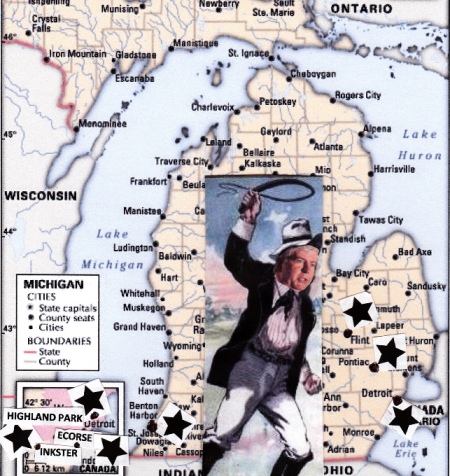
Slavemaster Rick Snyder has discriminated against the state’s majority Black cities through the use of EM laws.
(13) The plan provides for the continuation after its effective date of payment of all retiree benefits, as that term is defined in section 1114 of this title, at the level established pursuant to subsection (e)(1)(B) or (g) of section 1114 of this title, at any time prior to confirmation of the plan, for the duration of the period the debtor has obligated itself to provide such benefits.
(b) (1) . . . the court, on request of the proponent of the plan, shall confirm the plan notwithstanding the requirements of such paragraph if the plan does not discriminate unfairly, and is fair and equitable, with respect to each class of claims or interests that is impaired under, and has not accepted, the plan.
OBJECTION:
- Not proposed in good faith as indicated above; PA 436 forbidden by U.S. Constitution.
- Snyder, Orr, law firms not disclosed as insider perpetrators of bad-faith bankruptcy filing. Insider role in acceptance of swaps agreement by UBS AG, BOA; acceptance of 74 percent payment to Unlimited General Obligation bondholders; state itself has two votes, not disclosed in list of claims.
- It is doubtful whether the City of Detroit will survive as an independent municipality after implementation of plan.
- “Retiree benefits” refers to health care obligations; they have been cut drastically prior to the confirmation of the plan.Under the new plan, there is absolutely no guarantee they will ever be paid. See 11 U.S. Code § 1114 – Payment of insurance benefits to retired employees. (below this Section.)
- Plan clearly discriminates against city workers and retirees, the majority of whom are Black, as well as city residents, through such measures as the proposed takeover of the Detroit Water and Sewerage Department, which will lead to higher rates, It has already led to tens of thousands of water shut-offs, threatening the life and well-being of city residents and their families.
11 U.S. CODE § 1114 – PAYMENT OF INSURANCE BENEFITS TO RETIRED EMPLOYEES
(a) the term “retiree benefits” means payments to any entity or person for the purpose of providing or reimbursing payments for retired employees and their spouses and dependents, for medical, surgical, or hospital care benefits, or benefits in the event of sickness, accident, disability, or death under any plan, fund, or program (through the purchase of insurance or otherwise) maintained or established in whole or in part by the debtor prior to filing a petition commencing a case under this title.
(d)The court, upon a motion by any party in interest, and after notice and a hearing, shall order the appointment of a committee of retired employees if the debtor seeks to modify or not pay the retiree benefits or if the court otherwise determines that it is appropriate . . .
(e)(1)Notwithstanding any other provision of this title, the debtor in possession . . .shall timely pay and shall not modify any retiree benefits, except that—the court, on motion of the trustee or authorized representative, and after notice and and a hearing, may order modification of such payments . . .the trustee and the authorized representative of the recipients of those benefits may agree to modification of such payments, after which such benefits as modified shall continue to be paid by the trustee.
(f) (1) Subsequent to filing a petition and prior to filing an application seeking modification of the retiree benefits, the trustee shall—
(A) make a proposal to the authorized representative of the retirees, based on the most complete and reliable information available at the time of such proposal, which provides for those necessary modifications in the retiree benefits that are necessary to permit the reorganization of the debtor and assures that all creditors, the debtor and all of the affected parties are treated fairly and equitably; and
(k) (1)Upon the filing of an application for modifying retiree benefits, the court shall schedule a hearing to be held not later than fourteen days after the date of the filing of such application. All interested parties may appear and be heard at such hearing. Adequate notice shall be provided to such parties at least ten days before the date of such hearing. The court may extend the time for the commencement of such hearing for a period not exceeding seven days where the circumstances of the case, and the interests of justice require such extension, or for additional periods of time to which the trustee and the authorized representative agree.
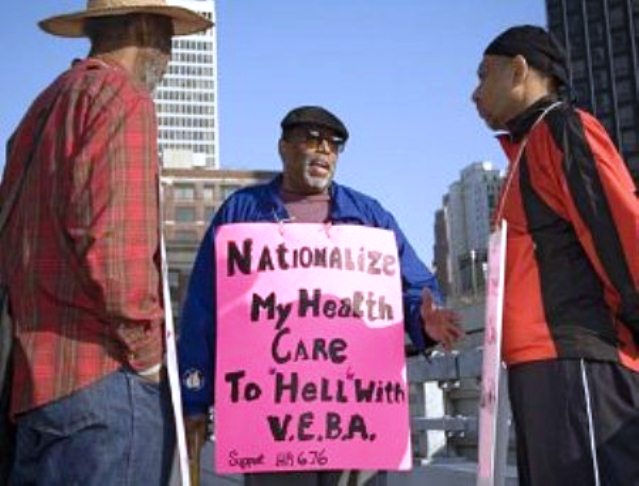
The late, world-renowned General Baker, a UAW retiree, protests the use of VEBA’s in the auto industry.
OBJECTIONS:
- THE CITY HAS REPEATEDLY CUT RETIREE HEALTH BENEFITS DURING THE TERM OF THIS BANKRUPTCY, PRIOR TO CONFIRMATION OF THE PLAN. WHEN DID THEY HOLD A HEARING ABOUT THIS?
- How are retirees being treated fairly and equitably when their insurance costs have skyrocketed, some to $500 and more a month?
- WHERE IS OUR HEARING ON THE NEW PLAN?
- Under the 4th Plan of Adjustment, retiree benefits will come from two VEBA’s (Voluntary Employee Benefit Associations) which are nothing but bank trusts which DO NOT GUARANTEE payment of ANY health benefits (stated clearly in the POA). The Court-appointed Official Committee of Retirees (OCR), the Detroit Retired City Employees Association (DRCEA), and the Detroit Police and Firefighters Association will sit on the VEBA boards. This opportunity to make money off the VEBA’s clearly motivated the OCR, DRCEA and DPFFA endorsements of the Plan.
Related articles:
http://voiceofdetroit.net/2014/06/07/why-im-voting-no-on-the-grand-bargain/
http://voiceofdetroit.net/2014/05/14/state-bills-target-detroit-assets-in-bankruptcy/
http://voiceofdetroit.net/2014/05/12/dccr-update-on-pensions-in-detroit-bankruptcy-plan-vote-no/
http://voiceofdetroit.net/2014/05/05/aarp-joins-other-groups-in-legal-support-for-detroit-retirees/
http://www.workers.org/articles/2014/01/22/teachers-strike-shuts-puerto-ricos-schools/
http://www.reuters.com/article/2014/01/15/us-usa-puertorico-teachers-idUSBREA0E13P20140115
http://www.reuters.com/article/2014/04/11/puertorico-pensions-idUSL2N0N325N20140411

